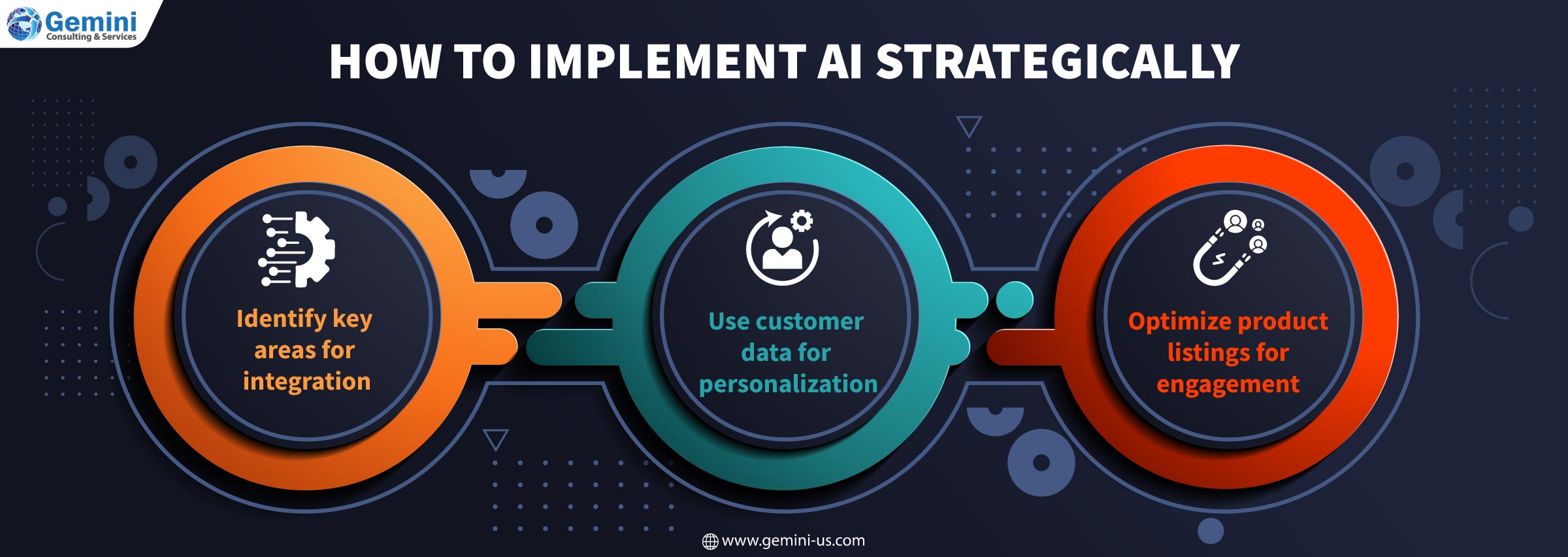The e-commerce industry is at the forefront of a digital transformation, powered by Artificial Intelligence (AI). From crafting personalized shopping journeys to optimizing backend operations, AI is unlocking new opportunities for online retailers. But how is this technology shaping the way customers shop and businesses grow? Let’s explore.
The Growth of AI in E-Commerce
With the exponential growth it has experienced over the past 10 years, the e-commerce sector is ideally placed to implement AI applications. What began with basic data analytics has evolved into sophisticated predictive algorithms that now play a central role in shaping the future of online retail. According to Precedence Research the global AI market in e-commerce is projected to expand from $5.81 billion in 2022 to $22.6 billion by 2032, reflecting a compound annual growth rate (CAGR) of 14.6% over this timeframe.
AI in e-commerce spans various technologies, including data mining, machine learning, and Natural Language Processing (NLP). These innovations work together to predict consumer behavior, automate customer service, and optimize logistics and inventory management. By leveraging AI, e-commerce platforms can offer more personalized shopping experiences, recommend products based on past interactions, and provide faster, more efficient customer support.
Predictive Analytics: Streamlining Inventory and Logistics
The e-commerce sector makes use of AI-based chatbots and virtual assistants to improve customer interactions and operational efficiency. These AI-powered tools have transformed customer service by providing 24/7 assistance, answering common questions, and helping customers complete transactions. AI is also improving inventory management through predictive analytics, enabling businesses to accurately forecast demand and optimize their supply chains.
On platforms like Amazon, AI plays a crucial role in optimizing product listings and enhancing customer interactions. By analyzing market trends and consumer behavior, AI ensures that products are not only visible but also attractive to potential buyers, driving organic growth and increasing sales. For instance, Amazon's AI-driven recommendation engine contributes to 35% of its sales by predicting user preferences and suggesting relevant products.

Generative AI: Revolutionizing Content Creation in E-Commerce
Generative AI, a branch of artificial intelligence, is making waves in e-commerce content creation. This technology allows platforms to automatically generate dynamic product descriptions and titles that reflect current trends and consumer preferences. By keeping content fresh and relevant, generative AI helps optimize product listings for both search engines and customer engagement, ensuring that e-commerce sites remain competitive.
The Future of AI-Powered E-Commerce
The future of e-commerce is being shaped by the continued evolution of AI, offering a glimpse into a world where online shopping is even more personalized, intuitive, and interactive. Innovations like advanced chatbots, predictive analytics for inventory management, and even drone-based delivery systems are set to redefine the customer experience and improve operational efficiency.
The Role of AI in Personalizing E-Commerce
At the core of AI’s impact on e-commerce is its ability to offer unmatched levels of personalization. In the future, AI will not only recommend products based on a customer’s past purchases but will also anticipate their needs before they even express them. For example, AI might predict that you need new running shoes before you even think to search for them, based on your shopping history and browsing patterns.
By dynamically optimizing product recommendations, AI ensures that each customer is shown products most likely to match their preferences, leading to a more satisfying shopping experience and fostering greater customer loyalty.
GenAI for Product Design
Generative AI is transforming the product design process by enabling faster, more efficient creation of innovative designs. By analyzing vast amounts of data, generative AI tools can assist designers in exploring a wide range of design possibilities, producing prototypes, and optimizing product aesthetics and functionality. For instance, AI-driven algorithms can automatically generate and refine 3D models based on specified parameters, allowing designers to iterate quickly and explore unconventional solutions that they might not have considered manually. This technology not only accelerates the design cycle but also allows for more customization and personalization in products, as AI can generate variations tailored to specific user preferences or requirements.
GenAI also facilitates virtual try-ons, thereby improving shopping experience. Whether it's clothing, eyewear, or cosmetics, AI can superimpose products onto a user’s image in real-time, offering a highly personalized and interactive shopping experience. By using deep learning and computer vision, generative AI can accurately map a customer’s features—such as body shape, facial structure, or skin tone—onto virtual products, ensuring a more realistic and tailored preview. This not only helps customers make more informed purchasing decisions but also reduces the likelihood of returns, benefiting both consumers and retailers by providing a more immersive, data-driven shopping experience.
Generative AI's Role in Marketing and UX
Generative AI is revolutionizing marketing by enabling brands to create highly personalized and dynamic content at scale. Marketers are leveraging AI-driven tools to automate content creation, from generating blog posts and social media updates to crafting tailored email campaigns and product descriptions. These AI systems can analyze vast amounts of consumer data, identifying patterns and preferences to deliver content that resonates with specific target audiences. Additionally, generative AI can optimize ad targeting, creating customized ad creatives and messaging that align with customer behavior, improving engagement, conversion rates, and overall campaign performance.
In the realm of User Experience (UX), generative AI is enhancing the design and development of more intuitive and user-centered interfaces. By analyzing user interactions, AI can predict behavior patterns, allowing designers to anticipate user needs and create personalized experiences. For instance, generative AI can suggest design adjustments, generate wireframes, or even produce entire UI layouts based on user feedback and interaction history. This streamlines the design process, reducing the time required to create functional and aesthetically pleasing interfaces while ensuring they are more aligned with user preferences, ultimately leading to improved usability and customer satisfaction.
Overcoming Challenges with AI
As e-commerce continues to grow, so do the challenges that come with managing an online business, from securing transactions to managing complex supply chains. AI offers powerful solutions to these problems, enhancing security, improving logistics, and providing insights for more efficient inventory management. AI enables e-commerce platforms to make data-drive decisions based on real time analytics and a secure shopping experience to customers.
Ready to revolutionize your e-commerce business with AI? Partner with Gemini Consulting & Services to create smarter, more engaging shopping experiences. Contact us to begin your journey towards a future where your online store becomes a destination for personalized, efficient, and memorable shopping experiences.
Strategically Implementing AI in E-Commerce

To integrate AI effectively into an e-commerce business, it’s essential to have a strategic plan in place. Here’s how to get started:
- Identify key areas for AI integration: Determine where AI can have the greatest impact. This might involve automating customer service with AI chatbots or using predictive analytics to manage inventory more effectively.
- Leverage customer data for personalized experiences: AI thrives on data. By gathering and analyzing customer behaviors and preferences, companies can customize shopping experiences to meet individual needs, improving engagement and driving sales.
- Optimize product listings for organic growth: Regularly update and refine product listings using AI, based on market trends and consumer search behavior, to maintain visibility and relevance.
Maximizing the Impact of AI in E-Commerce
E-commerce enterprises should focus on integrating AI with their existing operations to derive the maximum value from AI and trigger enterprise growth.
- Integrate AI with existing platforms: AI should complement and enhance current e-commerce systems without disrupting ongoing operations.
- Train your team: Ensure that employees understand how to use AI tools effectively, from optimizing listings to interpreting data-driven insights.
- Monitor and improve: AI tools should be continuously evaluated and refined. Organizations must focus on analyzing performance metrics so that they can strategize to achieve the required results.
Future Trends
The future of shopping is set to be revolutionized by a blend of AI-driven augmented reality (AR) and virtual reality (VR), offering highly immersive and personalized experiences. Consumers will be able to virtually try on clothes, test products in their own environments, or explore virtual storefronts, all from the comfort of their homes. Hyperlocal personalization, fueled by AI, will ensure that recommendations, offers, and content are tailored to the individual’s location, preferences, and even current weather, enhancing the relevance and appeal of every interaction. Additionally, payment methods are evolving, with AI-powered innovations like voice commerce enabling seamless transactions through smart devices. Shoppers will be able to make purchases using natural language, making the checkout process faster and more intuitive.
Embracing the AI Revolution in E-Commerce
Adopting AI in e-commerce offers enterprises a competitive advantage in the digital marketplace. By personalizing the shopping experience, optimizing operations, and solving common challenges with innovative solutions, AI helps e-commerce platforms meet and exceed customer expectations.
Conclusion
As the digital marketplace evolves, AI is not just a tool but the foundation of modern e-commerce success. From personalization to predictive analytics, its potential is transformative. For e-commerce businesses looking to maintain a competitive edge, harnessing AI tools is essential for achieving their maximum capabilities.



